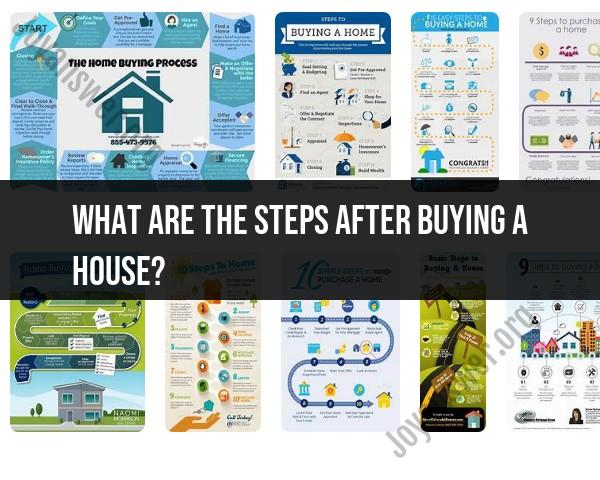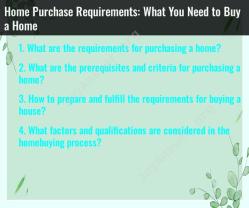What are the steps after buying a house?
After buying a house, your homeownership journey involves several important steps to help you settle into your new home and manage your property effectively. Here are the key steps to take after purchasing a house:
Home Inspection and Final Walkthrough:If you didn't have a detailed home inspection before buying the house, it's a good idea to schedule one after the purchase. Also, conduct a final walkthrough to ensure that the property is in the condition agreed upon in the sales contract.
Obtain Homeowners Insurance:Secure homeowners insurance to protect your property from potential damage or loss. Your lender may require this insurance as a condition of your mortgage.
Change the Locks:For security reasons, it's a good practice to change the locks on your doors and update the security codes for any smart locks or alarm systems.
Utilities Transfer:Transfer or set up your utilities, including electricity, gas, water, internet, cable, and trash collection, in your name. Ensure all services are working properly.
Register with Local Services:Register for local services such as garbage collection, recycling, and water billing, if applicable to your location.
Home Repairs and Upgrades:Make any necessary repairs or perform desired home upgrades. This might include painting, fixing minor issues, or renovations.
Familiarize Yourself with Appliances and Systems:Get to know the operation of appliances, HVAC systems, plumbing, and electrical systems in your new home.
Pest Control and Maintenance:Consider pest control measures and establish a regular maintenance schedule for the home, including HVAC servicing, gutter cleaning, and more.
Emergency Contacts and Services:Prepare a list of local emergency contacts, including plumbers, electricians, contractors, and neighbors, for quick access in case of emergencies.
Update Your Address:Notify the postal service, banks, government agencies, and other relevant organizations of your change of address.
Create a Home Inventory:Catalog your valuable possessions, especially items that may need special insurance coverage. This will be helpful in case of loss or damage.
Set Up a Budget:Create a household budget that takes into account your mortgage payments, property taxes, homeowners insurance, and ongoing maintenance costs.
Landscaping and Yard Care:Attend to landscaping, lawn care, and garden maintenance. Planting, mowing, and weeding may be necessary depending on the season.
Know Your Neighborhood:Familiarize yourself with your new neighborhood. Explore nearby amenities, schools, healthcare facilities, and community services.
Community Involvement:Consider getting involved in community activities or neighborhood associations to meet your neighbors and become a part of your local community.
Organize Important Documents:Keep important documents such as your mortgage paperwork, property records, homeowners insurance policies, and warranties in a secure and accessible location.
Security and Safety:Evaluate your home's security systems and consider installing additional safety measures such as smoke detectors, carbon monoxide detectors, and home security systems.
Enjoy Your New Home:Lastly, take time to enjoy your new home and make it your own by decorating, arranging furniture, and creating a space that reflects your style and comfort.
Becoming a homeowner comes with both responsibilities and opportunities for personalization. Taking these steps will help you transition smoothly into your new home and ensure a pleasant and secure living environment.
Congratulations on buying your new home! Transitioning into homeownership brings a mix of excitement and responsibilities. Here's a guide to help you navigate this new chapter:
After Buying a House: Essential Steps for New Homeowners
Change the locks: Ensure your home's security by replacing the locks, including those on doors and windows.
Update homeowner's insurance: Obtain adequate homeowner's insurance to protect your investment against unforeseen events.
Schedule utility transfers: Contact utility companies to transfer services into your name and schedule any necessary inspections.
Update address information: Inform relevant parties, such as banks, employers, and government agencies, of your new address.
Introduce yourself to neighbors: Build a cordial relationship with your neighbors to foster a sense of community.
Moving into Your New Home: Practical Tips and Checklist
Create a moving checklist: Plan and prioritize tasks, such as packing, arranging movers, and scheduling utility transfers.
Organize packing and labeling: Use sturdy boxes, label them clearly, and pack room by room for easy unpacking.
Protect valuables during transit: Secure fragile items with proper packing materials and consider special handling for valuables.
Coordinate with movers: Communicate clearly with movers about expectations, access to the property, and any special handling instructions.
Prioritize unpacking essentials: Focus on unpacking essential items like bedding, toiletries, and kitchen utensils for immediate needs.
Homeownership Responsibilities and Maintenance
Regular maintenance: Establish a routine for basic maintenance tasks, such as checking smoke detectors, cleaning gutters, and maintaining appliances.
Seasonal upkeep: Prepare your home for seasonal changes, including winterizing pipes, clearing gutters, and maintaining landscaping.
Emergency preparedness: Create an emergency plan with escape routes, meeting points, and essential supplies in case of natural disasters or emergencies.
Home improvement projects: Prioritize home improvement projects based on necessity and budget, considering DIY or professional assistance.
Financial Planning After Home Purchase: Budgeting and Savings
Review your budget: Adjust your budget to accommodate new expenses like mortgage payments, property taxes, and homeowner's insurance.
Establish an emergency fund: Set aside funds for unexpected home repairs or emergencies to avoid financial strain.
Plan for future expenses: Consider future expenses like major renovations or replacements and incorporate savings goals into your budget.
Seek financial advice: Consult a financial advisor for personalized guidance on managing your finances and long-term planning.
Building a Happy and Secure Life in Your New Home
Personalize your space: Decorate and furnish your home to reflect your style and create a comfortable and welcoming environment.
Host gatherings: Invite friends and family to share your new home, fostering connections and creating warm memories.
Explore the neighborhood: Discover local amenities, parks, and community events to connect with your surroundings and build a sense of belonging.
Embrace homeownership: Enjoy the pride and satisfaction of owning your own home, creating a secure and fulfilling living space for yourself and your loved ones.













